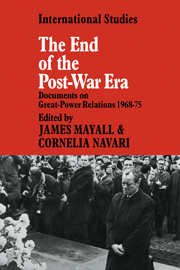Book contents
- Frontmatter
- Contents
- Preface
- Source Abbreviations
- Note on the texts of the documents
- Introduction
- I THE END OF THE COLD WAR
- II THE DIPLOMACY OF DETENTE
- III CHANGES IN THE WESTERN ALLIANCE
- IV THE WARSAW TREATY ORGANISATION
- THE WARSAW TREATY ORGANISATION
- V THE GREAT POWERS AND THE MIDDLE EAST WAR OF OCTOBER 1973
- VI THE CRISIS OF THE INTERNATIONAL ECONOMIC ORDER
THE WARSAW TREATY ORGANISATION
Published online by Cambridge University Press: 07 October 2011
- Frontmatter
- Contents
- Preface
- Source Abbreviations
- Note on the texts of the documents
- Introduction
- I THE END OF THE COLD WAR
- II THE DIPLOMACY OF DETENTE
- III CHANGES IN THE WESTERN ALLIANCE
- IV THE WARSAW TREATY ORGANISATION
- THE WARSAW TREATY ORGANISATION
- V THE GREAT POWERS AND THE MIDDLE EAST WAR OF OCTOBER 1973
- VI THE CRISIS OF THE INTERNATIONAL ECONOMIC ORDER
Summary
Speech by Mr Brezhnev at the Fifth Congress of the Polish United Workers' Party, the ‘Brezhnev doctrine’, Warsaw, 12 November 1968 (extract)
The socialist states stand for strict respect for the sovereignty of all countries. We emphatically oppose interference in the affairs of any states and violations of their sovereignty.
At the same time the establishment and defence of the sovereignty of states which have set out on the road of building socialism is of particular importance for us communists. The forces of imperialism and reaction are seeking to deprive the people now of this, now of that socialist country of the sovereign right they have won to ensure the prosperity of their country and the wellbeing and the happiness of the broad masses of the working people by building a society free from all oppression or exploitation. And when attacks on this right meet with a united rebuff from the socialist camp, bourgeois propagandists raise a clamour around ‘defence of sovereignty’ and ‘non-interference’. It is clear that this is a complete fraud and utter demagogy on their part. In reality those who shout in that way are not concerned with preserving socialist sovereignty but with destroying it.
It is common knowledge that the Soviet Union has done much for the real strengthening of the sovereignty and independence of the socialist countries. The Communist Party of the Soviet Union has always advocated that each socialist country should determine the specific forms of its development along the road of socialism, taking into consideration its own specific national conditions.
- Type
- Chapter
- Information
- The End of the Post-War EraDocuments on Great-Power Relations 1968-1975, pp. 523 - 534Publisher: Cambridge University PressPrint publication year: 1980

